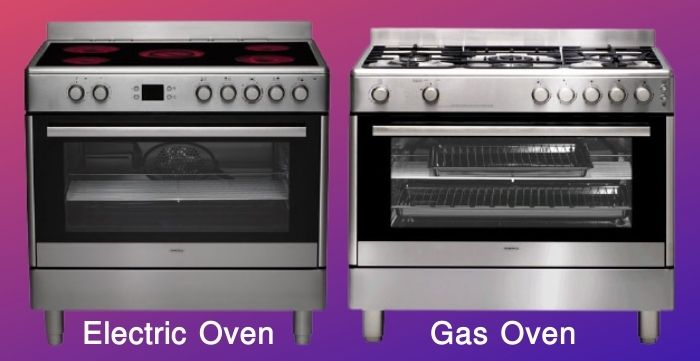
Understanding How Gas Ovens and Electric Ovens Work
Gas ovens depend on burner ignition to bake or grill food. You’ll notice the burner at the bottom. However, high quality gas range have at least two burners, with the second one at the top of the oven. They work by releasing moisture into the oven, making them perfect for baking pastries and pasta.
Electric ovens have a visible electrical coil at the bottom. They work by radiating heat to the entire baking or grilling area. Unlike gas, electric ovens take more time to heat and cool down. Other electric brands have a third heating component that looks circular. You can find it at the back of the oven cavity.
The Benefits of Gas Oven vs Electric Oven: Who is the Winner?
When deciding between gas ovens and electric ovens, consider the following factors:
- Cooking method: How does either option compare to the cooking results?
- Usage cost: How much is either option’s initial and utility cost?
- Cooking time: How long does either option take to warm up and heat the food?
- Installation requirements: Can you apply the DIY method to install it, or must you call an installation expert?
1. Cooking Method
A gas oven grants you more control, whether you’re a cooking amateur or connoisseur. If the temperatures rise, you can adjust it and vice versa. Keep in mind that gas produces more heat, which may burn the edges of your food. That means you can’t take your eyes off your oven for a minute. On the flip side, gas burns in a moist environment, making it a perfect option for roasting enthusiasts.
Electric ovens, on the other hand, produce dry heat. This makes them perfect for baking or roasting. They have hobs that are easy to clean, giving you an easier time cleaning up after cooking. Also, they cook food slowly, preserving its flavor.
2. Usage Cost
Going by Money’s report, gas models under the best range list have a 6p per Kilowatt hour (KWh). They are 50% cheaper than electric ovens compared to the upfront costs. If you’re budget-conscious, go for gas.
Electric ovens come with 12p per kWh. That means you will have to spend more on initial cost and power coverage. Should a power outage occur, you’ll have to postpone your cooking until power returns. It’s also highly likely that the prices of electric ovens will skyrocket due to green taxes imposed on electricity.
3. Cooking Time
Before putting your food in your gas oven, you’ll need to wait 10 minutes or less for it to warm up. So, that means the cooking time will be shorter. For example, it will take roughly 40 minutes to grill your steak because the gas’s heat is evenly distributed.
An electric oven can take more than 10 minutes to warm up because it heats specific components like the grill. It also retains heat for long periods, making it difficult to control the temperatures. That means you have to wait at least one hour for it to cool down before introducing another meal to cook.
4. Installation Requirements
Gas ovens can only work if a professional gas fitter installs them. You realize that a gas leak can put your entire household in danger if it’s wrongly installed. However, the latest gas range with griddle options is safe to handle and hardly encounters leaks. Should you notice a leak, there’s a problem with your appliance or gas source. So that means you’ll need to outsource services from a gas plumbing company to run the gas line in your home.
Electric ovens are the easiest to work with because they don’t depend on external sources of fuel that need pipes like natural gas. All you need is an outlet, and your oven will be up and running in no time. However, if you live in a frequent power outage or unstable power supply, this oven won’t be a reliable solution.
Which is Your Best Pick?
Overall, who wins in the war between electric and gas depends on your cooking personality and preferred cooking methods. Upon examining the benefits of gas oven vs electric oven, it’s easy to conclude who the winner is. Gas ovens are eco-friendly, affordable, and easy to control. Its cooking style involves distributing moisture evenly, ensuring your food doesn’t get crispy. Perhaps the only pitfall that natural gas has is the installation convenience.
On the other hand, electric ovens work differently. They suck in moisture from your food. They’re not good for baked wheat products. The only biggest selling point that an electric oven has over gas is the installation convenience. Whether you’ve settled on gas ovens or electric ovens, it’s all about what suits you.
Leave a Reply